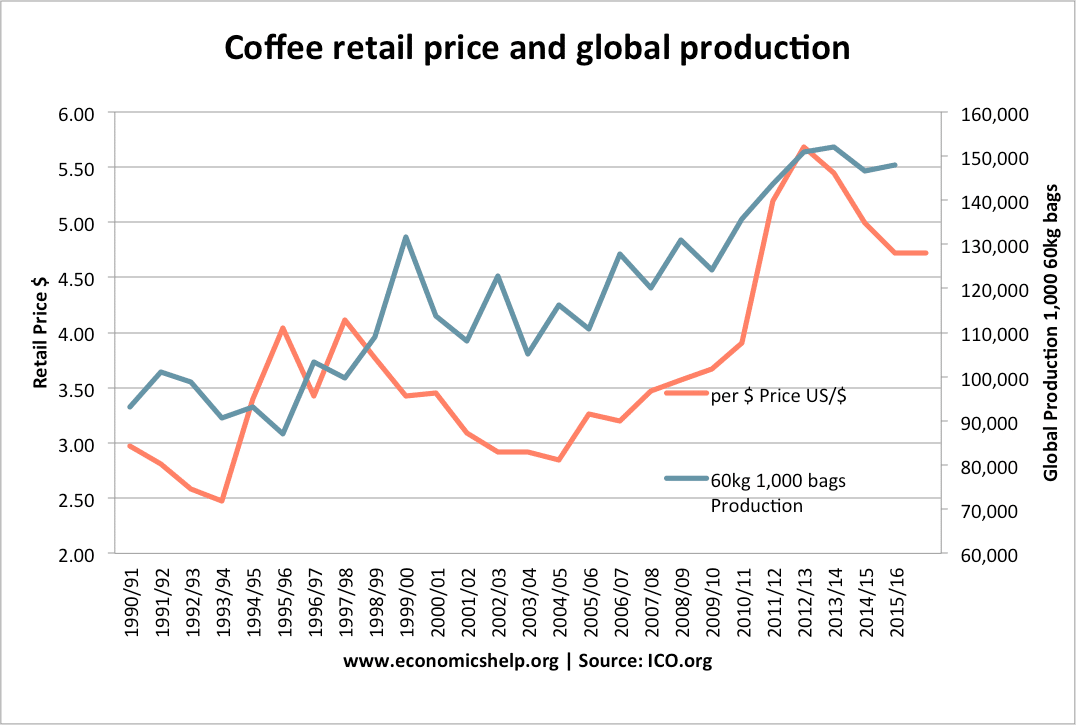If coffee beans cost 4 pence per cup, how can big retailers like Starbucks or Costa Coffee sell a small cappuccino for £3.00?

Comment from: Is the Price of Starbucks a rip off?
Is the price of Starbucks coffee a rip off you ask… I have seen on this website you have written some article on supply and demand and therefore the answer should be quite obvious. Starbucks coffee as sold from their many outlets which need to cover the cost of each shop, packaging, staff, etc etc.
Remember when buying their coffee you are also buying a brand and also their experience – that costs money so no it is not a rip off they have simply put a value on their product to distinguish themselves in the market.
I think the reader makes a good point. Starbucks operates in a competitive market. If it charges £2.80 for a cappuccino then you could argue that is a ‘fair’ market price because that is what people are willing to pay.
What goes into the price of coffee?
After oil the most frequently traded commodity in the world is coffee. Coffee is an important export for many developing countries and coffee bars have become increasingly popular as an alternative to the old fashioned pub. Coffee is big business.
The price of coffee can vary hugely. I am currently writing this essay at Café Nero in Blackwells Bookshop Oxford. For a small cappuccino, it cost me £2.75. On the one hand, this is expensive; especially if you consider the raw materials of coffee and milk cost less than 4p. How does Café Nero justify charging such a high-profit margin?
- We are not just paying for the coffee but for the opportunity of sitting in a pleasant environment for up to 1 and a half hours. Not only can I spend as long as I want but I can also consult books to help me write essays. (1) From this perspective, £2.75 to stay in a premium location in the centre of town for 1 hours seems quite a good deal.
- Coffee shops have to deal with low volume. A pint of beer in a pub used to have a low-profit margin, but customers would regularly drink several pints. Lower profit margins worked because they were able to sell quantity. Coffee is not the kind of drink where you consume more than 1 or 2. With lower volume, coffee shops need a higher profit margin to maintain profitability.
- Price Discrimination. Like any firm coffee shops are seeking to charge the profit maximising price. Many consumers have a very inelastic demand for coffee. This is because there are few close alternatives to coffee and it is a relatively small % of income. If the coffee had been £3.50 I probably would still have paid it. The challenge for coffee shops is to find a way to charge to more to people like me without putting off customers who are sensitive to price changes.
- Charging for extras. This idea of price discrimination can be viewed in more detail by looking at how coffee shops charge for extras. One example is the extra price charged for the “fair trade” version. Fairtrade coffee involves paying poor farmers a premium for their coffee. This can help them to gain a decent living. Café direct pay a premium to farmers of about 45p per pound. However, to make a cappuccino requires only ¼ an ounce of coffee. Therefore the extra cost should be equal to less than 1p. However, most coffee shops charge a premium of at least 10p. (1) This means most of the extra price goes in higher profit to the coffee shops.
- There are many customers who are price-insensitive therefore they do not mind paying an extra 10p. In effect, they are paying a premium for enjoying coffee with a conscience. From the firm’s point of view they are grasping consumer surplus from those with inelastic demand.
When Could Market Prices not Be Fair?
- If a firm has monopoly power and it charges higher prices than in a competitive market. For example, an electric supplier may have monopoly power and it could charge high prices because demand is inelastic. This is not really the case with Starbucks because there is a reasonable level of competition for coffee on the high street.
- Trading on its Brand Name. You could argue a firm like Starbucks builds up a brand loyalty causing demand to be inelastic but, then the quality of its product deteriorates and it relies on a consumer loyalty it doesn’t really deserve. This is rather a moot point and certainly slips into the realm of ‘normative economics’. If you ask several people about the quality of Starbucks, you will get several different answers. But, I assume, those buying the Starbucks think it is worth the price otherwise why would they continue to do buy it?
- If a firm has monopsony buying power. It is sometimes argued that big multinationals have market power in buying coffee from farmers in the developing world. In other words, farmers are told unless you sell at a low price, we will not buy. As there are few alternatives, the farmers agree to the terms and end up small profit margin. Therefore, for a cup of coffee costing £3.00, the farmer may be getting just £0.03 for the coffee beans.
Conclusion
To be honest, it is rather hard to justify that Starbucks coffee is a ‘rip off’. I think it often produces the most disappointing espresso on the high street (though I like their filter coffee), but that is just a personal view and enough people seem to take a different view and are happy to pay the price. In the absence of monopoly power, you can argue the price is reasonably fair given the competitive nature of the market.
(1) Tim Harford The Undercover Economist p33.
